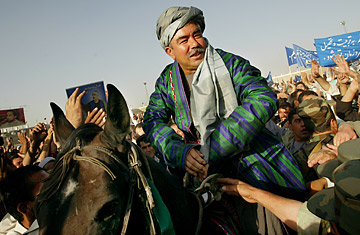
(3 of 3)
Samimi laments the squandered chance for Afghanistan to start over. "Right after the collapse of the Taliban, the government had the opportunity to go after these commanders because they were scared and weak," she says. "Instead, the international community and the government supported them and made them stronger. They didn't bring them to justice. They waited until they committed more crimes. For this we ousted the Taliban?"
Karzai has frequently lashed out at the international community for supporting the warlords, even as he too tries to keep them on his side. "The Afghan point of view is, Cut relations, stop backing them," he said in an interview last year. "Stop giving them contracts, stop arming them, and stop using them as political tools." Robust and public prosecution of their crimes would limit the warlords' power. The West would have to shoulder more of the security burden, but that may be unavoidable if the U.S. still hopes to transform Afghanistan.
Educated moderates like Samimi have no love for the Taliban. But they have become disillusioned with the current government, in large part because of the unaddressed venality of militia commanders. Francesc Vendrell, the former European Union envoy to Afghanistan, holds that warlordism, as he calls it, is just as much at the root of the insurgency as religious ideology. "In Muslim society, justice is the most essential element, and here in Afghanistan, people simply don't see it exist. They see impunity, they see a few people become extremely wealthy, and they see cruelty," Vendrell says. "Therefore I think many of them are fence sitters. And you can't hope to win an insurgency when the civilians are sitting on the fence."
